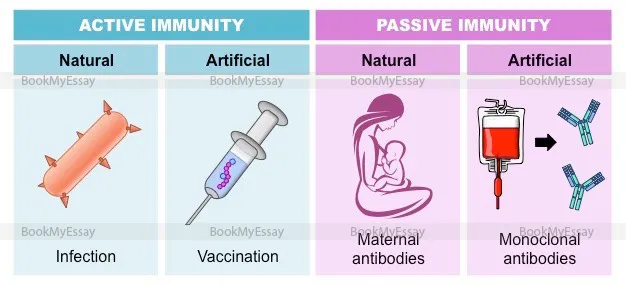Active Vs Passive Immunity
Understanding the dichotomy between active and passive immunity forms the crux of immunization and vaccination assignments. Active immunity is achieved when the body generates an immune response after encountering a pathogen, either through infection or vaccination. This process triggers the production of antibodies, providing long-term protection against future exposures to the same pathogen. On the other hand, passive immunity involves receiving pre-formed antibodies, either naturally through the placenta or artificially via injections containing antibodies. This method offers immediate but short-term protection.
Immunization and vaccination assignment help often delve into the nuances of these two mechanisms. Active immunity fosters a robust and personalized defense system, empowering the body to recognize and combat specific pathogens. Conversely, passive immunity is rapid but temporary, offering immediate protection without the body's active involvement in generating antibodies.
Understanding the intricacies of these immune responses is vital in designing effective vaccination strategies. Assignment help concerning immunization and vaccination often explores the advantages, limitations, and applications of both active and passive immunity, emphasizing their roles in disease prevention and public health interventions. Analyzing their strengths and weaknesses helps in devising tailored approaches for safeguarding individuals and populations against various infectious diseases.
How Does Active Immunity Differ From Passive Immunity?
Active and passive immunity are two distinct mechanisms providing resistance against pathogens, differing in their mode of acquisition and duration of protection. In academic medicine, understanding these concepts is pivotal, often explored within the realm of biomedical engineering assignment help concerning disease prevention and immunization strategies.
Active immunity involves the body's immune system responding to a pathogen, creating antibodies and memory cells. This defense mechanism occurs naturally upon infection or artificially through immunization, as seen in biomedical engineering assignments. Immunization prompts the immune system to generate a specific response, offering long-term protection against future encounters with the same pathogen.
On the other hand, passive immunity involves the transfer of ready-made antibodies from an external source, providing immediate but temporary protection. This occurs naturally during breastfeeding, where a baby receives antibodies from the mother's milk. Additionally, it can be induced artificially, such as by administering antibodies or antitoxins, offering immediate but short-lived protection against a specific pathogen.
Biomedical engineering assignments often delve into designing vaccines for active immunity, focusing on stimulating the body's immune response for long-lasting protection. Conversely, the exploration of passive immunity aids in understanding immediate protection strategies, crucial in certain medical scenarios.
In academic medicine assignment help, discerning the differences between active and passive immunity shapes approaches to combat diseases, offering diverse strategies for protection and treatment.

Which Immunity Is More Effective, Passive Or Active?
In the realm of medical science, understanding the contrasting dynamics between passive and active immunity plays a pivotal role. Active immunity involves the body's immune system responding to antigens by producing its antibodies, achieved through natural exposure to a pathogen or vaccination. This method instigates a memory response, ensuring rapid and robust defense upon subsequent encounters with the same pathogen. On the other hand, passive immunity results from the introduction of pre-formed antibodies, either artificially through immunotherapy or naturally from the mother to the fetus during pregnancy or through breastfeeding.
Determining the effectiveness of these immunities is nuanced. Active immunity provides prolonged protection due to memory cell activation, offering a comprehensive defense against various pathogens. However, it takes time to develop and might not be suitable for individuals with compromised immune systems. In contrast, passive immunity offers immediate but short-term protection, ideal for emergency situations or vulnerable populations. Yet, it lacks memory response and thus doesn't confer long-lasting protection.
The choice between passive and active immunity depends on the context, patient condition, and the nature of the threat. Medical science acknowledges the importance of both forms of immunity, utilizing each strategically based on the situation's urgency, duration, and specific requirements.
For Doctoral Dissertation Writing Help in the field of biomedical engineering and academic medicine assignments focusing on immunization, understanding the efficacy and application of active versus passive immunity proves crucial in devising innovative solutions and treatments within medical science.
Does BookMyEssay Offer Illustrations Of Both Passive And Active Immunity?
BookMyEssay, an online assignment help service, comprehensively covers both active and passive immunity in its resources. Active immunity involves the body's production of antibodies following exposure to antigens, either through vaccination or contracting an illness. BookMyEssay elucidates this process, highlighting how the immune system retains memory cells for future defense.
Conversely, passive immunity doesn't involve the body's immune response but rather the direct transfer of antibodies from an external source. This could occur naturally, such as a mother passing antibodies to her baby during breastfeeding, or artificially through medical intervention, like administering pre-formed antibodies. BookMyEssay elucidates these concepts, explaining their mechanisms, advantages, and limitations.
Their doctoral research paper help assignment help extensively covers the nuances between active and passive immunity, offering illustrations, examples, and case studies to aid understanding. Through their online resources, BookMyEssay equips students with detailed insights into these immunity types, supporting academic endeavors in medical science assignments. The platform ensures a comprehensive understanding of these concepts, aiding students in their doctoral dissertation writing, biomedical engineering, and academic medicine assignments, emphasizing the significance of these immunological aspects within medical science.







 3 Bellbridge Dr, Hoppers Crossing, Melbourne VIC 3029
3 Bellbridge Dr, Hoppers Crossing, Melbourne VIC 3029




